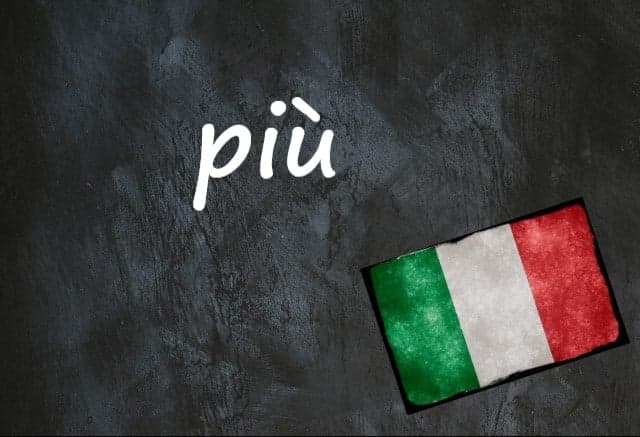Italian word of the day: 'Più'

There are more ways to use this little word than you might think.
We learn this word quite early on in our Italian language studies. But often, we later find that it's even more useful than first thought.
Più has various applications, including as an adverb, adjective, and noun. Let's have a look at how they work.
The most important (and obvious) meaning of più is as an adjective meaning “more”.
- Ha fatto più punti di me.
- He scored more points than me.
More often it's paired with an adjective and becomes as a modifying adverb, usually creating phrases that, literally translated, would not be grammatically correct in English: (“more fast”, “more happy”, “more cold”, etc.)
- È più ricco di quanto pensassi
- He’s richer than I thought (which literally translates to the grammatically questionable: “he's more rich than what I thought”.)
- Si è svolto tutto più rapidamente del previsto.
- Everything happened faster than expected.
It also doubles up as a superlative: più means “most” when it's used like this:
- È il più preparato della classe
- He’s the best student (literally "most prepared" student) in the class.
And in certain contexts, it can also mean “many”:
- È un film che ho già visto più volte.
- It’s a movie that I have seen many times.
As a noun, it means the “majority” or “bulk” of something.
- I più hanno votato contro
- The majority voted against.
And di più/in più also means “more” or “longer”. It's often found in phrases that mean “no more/not any more”
- Non verrà più
- He won’t come any more.
When used in mathematics, it means “plus”:
- Tre più tre fa sei.
- Three plus three equals six.
And it can also mean “plus” or “in addition to” in other scenarios:
- Il costo è di duecento euro più IVA.
- The price is two hundred euros plus VAT.
And when talking about temperature, it means “above”, as in above zero.
- La temperatura massima è stata di più cinque.
- The high temperature was five degrees above zero.
It's pronounced "pyoo" - hear it here. Don't forget that the accent is important when speaking as well as writing.
Phrases that include the word include per lo più (usually), and più o meno (more or less.)
These are the most common uses of più, although we're sure there are plenty more.
Do you have a favourite Italian word you'd like us to feature? If so, please email us with your suggestion.
Comments
See Also
We learn this word quite early on in our Italian language studies. But often, we later find that it's even more useful than first thought.
Più has various applications, including as an adverb, adjective, and noun. Let's have a look at how they work.
The most important (and obvious) meaning of più is as an adjective meaning “more”.
- Ha fatto più punti di me.
- He scored more points than me.
More often it's paired with an adjective and becomes as a modifying adverb, usually creating phrases that, literally translated, would not be grammatically correct in English: (“more fast”, “more happy”, “more cold”, etc.)
- È più ricco di quanto pensassi
- He’s richer than I thought (which literally translates to the grammatically questionable: “he's more rich than what I thought”.)
- Si è svolto tutto più rapidamente del previsto.
- Everything happened faster than expected.
It also doubles up as a superlative: più means “most” when it's used like this:
- È il più preparato della classe
- He’s the best student (literally "most prepared" student) in the class.
And in certain contexts, it can also mean “many”:
- È un film che ho già visto più volte.
- It’s a movie that I have seen many times.
As a noun, it means the “majority” or “bulk” of something.
- I più hanno votato contro
- The majority voted against.
And di più/in più also means “more” or “longer”. It's often found in phrases that mean “no more/not any more”
- Non verrà più
- He won’t come any more.
When used in mathematics, it means “plus”:
- Tre più tre fa sei.
- Three plus three equals six.
And it can also mean “plus” or “in addition to” in other scenarios:
- Il costo è di duecento euro più IVA.
- The price is two hundred euros plus VAT.
And when talking about temperature, it means “above”, as in above zero.
- La temperatura massima è stata di più cinque.
- The high temperature was five degrees above zero.
It's pronounced "pyoo" - hear it here. Don't forget that the accent is important when speaking as well as writing.
Phrases that include the word include per lo più (usually), and più o meno (more or less.)
These are the most common uses of più, although we're sure there are plenty more.
Do you have a favourite Italian word you'd like us to feature? If so, please email us with your suggestion.

Join the conversation in our comments section below. Share your own views and experience and if you have a question or suggestion for our journalists then email us at [email protected].
Please keep comments civil, constructive and on topic – and make sure to read our terms of use before getting involved.
Please log in here to leave a comment.